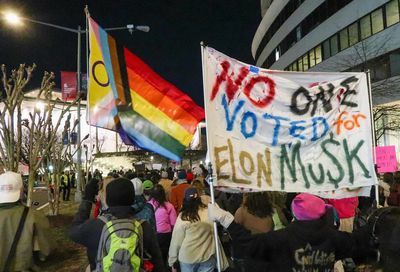LGBTQ groups demand documents about CDC censorship
Lambda Legal and others file FOIA request to see who proposed and approved ban on certain words

A coalition of LGBTQ groups has filed a Freedom of Information Act request for documents from the Trump administration regarding the decision to ban “transgender” and other words from CDC budget documents.
Trump allegedly banned the use of words that conservatives find either controversial or objectionable, including “vulnerable,” “entitlement,” “diversity,” “transgender,” “fetus,” “evidence-based,” and “science-based” in budget documents.
After news of the ban broke, Lambda Legal, the Human Rights Campaign and the National Center for Transgender Equality filed a FOIA request for “any and all” correspondence relating to the Trump administration’s decision to police the words used by the CDC or other government agencies.
The coalition also sent a letter to Mike Mulvaney, the director of the Office of Management and Budget, demanding a meeting to discuss the motivation behind the censorship.
“The CDC is no place for politics. Censoring our nation’s public health agency isn’t just an Orwellian joke — it endangers lives,” Rachel Tiven, the CEO of Lambda Legal, said in a statement. “Our most vulnerable family — transgender people, women, communities of color, and everyone living with and at higher risk of HIV — will suffer first and most from being erased.
“At the height of the AIDS epidemic, Ronald Reagan refused to say the words HIV and AIDS,” Tiven added. “Precious lives were lost because the government ignored us and pretended we didn’t exist. Never again.”
The censorship at the CDC was particularly alarming in light of past actions the administration has taken to exclude or refuse to recognize LGBTQ people.
Earlier this year, the Department of Health and Human Services removed demographic questions about sexual orientation and gender identity in an annual survey of people who participate in programs funded by the Older Americans Act.
The question on sexual orientation was eventually reinstated, but the question concerning gender identity was never restored.
Scott Schoettes, the HIV Project Director at Lambda Legal, said the censorship of certain terms will only worsen health disparities for already vulnerable populations.
For example, agencies that study HIV prevention among specific populations, like transgender people, may be prevented from being able to complete their research or share their finding, lest they run afoul of the ban on prohibited words.
It may also make it more difficult to justify the funding they ask for if they are unable to explain what progress they’ve made.
“We will do everything in our power to get to the bottom of this and fight it,” Schoettes said in a statement. “If this administration does not reverse this directive, they will end up with blood on their hands.”
“Why the administration would want to tie the hands of policymakers trying to serve vulnerable populations is beyond comprehension,” added Max Isaacs, a Lambda Legal Law Fellow. “The public has a right to know what language restrictions have been put in place, who is subject to them, and why the administration created this dangerous and misguided policy.”
Support Metro Weekly’s Journalism
These are challenging times for news organizations. And yet it’s crucial we stay active and provide vital resources and information to both our local readers and the world. So won’t you please take a moment and consider supporting Metro Weekly with a membership? For as little as $5 a month, you can help ensure Metro Weekly magazine and MetroWeekly.com remain free, viable resources as we provide the best, most diverse, culturally-resonant LGBTQ coverage in both the D.C. region and around the world. Memberships come with exclusive perks and discounts, your own personal digital delivery of each week’s magazine (and an archive), access to our Member's Lounge when it launches this fall, and exclusive members-only items like Metro Weekly Membership Mugs and Tote Bags! Check out all our membership levels here and please join us today!






















You must be logged in to post a comment.